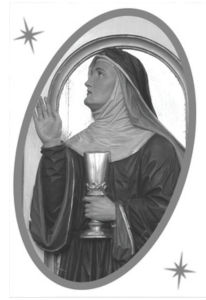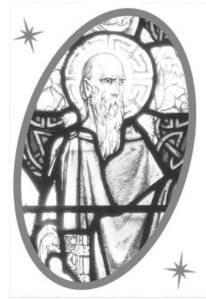We continue our alphabetical romp thorough the bracket a Mechtild of Magdeburg stares down Ninian (of Nowhere in Particular). Sorry, sometimes you have to add some alliteration where it doesn't exist. Nonetheless, it's a German medieval mystic vs. a Scottish missionary.
In yesterday's action, Hiram Kano took down Lucy of Syracuse 56% to 44% to advance to the Saintly Sixteen against Emily Cooper.
Vote now!
Mechthild of Magdeburg
 Mechthild of Magdeburg was a medieval mystic, a groundbreaking poet and a self-described “unruly woman of God.” Honestly, what more do you need to know?
Mechthild of Magdeburg was a medieval mystic, a groundbreaking poet and a self-described “unruly woman of God.” Honestly, what more do you need to know?
Mechthild was born around 1207 in northern Germany and had her first religious vision at age twelve. “The day of my spiritual awakening was the day I saw and knew I saw all things in God and God in all things,” she wrote.
Her visions continued daily, which led Mechthild to travel to the diocesan seat of Magdeburg in her twenties to join a group of Beguines there. Beguines were one of a number of religious orders springing up at the time. Many lived together in community, encouraging one another to imitate Jesus by living lives of prayer and service in the world, but they were not officially recognized by the pope and did not take formal vows.
In her forties, her confessor, a Dominican priest named Henry of Halle, encouraged her to write about her mystical encounters, which became the spiritual classic Das fließende Licht der Gottheit, or The Flowing Light of the Godhead. Notably, Mechthild composed the seven volumes of The Flowing Light of the Godhead in the Low German spoken in Magdeburg at the time, rather than in the usual Latin of the Church. Hundreds of years before Martin Luther translated the Bible into German, Mechthild was one of the first European Christians to popularize the language of the people as language able to communicate the sacred.
The books include accounts of her experiences, revelations of the divine, devotional poems, and criticisms of church corruption so fiery that there were calls to burn her books. Some scholars believe her descriptions of heaven, hell, and purgatory may have influenced Dante’s Divine Comedy. In one of her best-known poems, Mechthild wrote: “A fish in water does not drown. A bird in the air does not plummet. Gold in fire does not perish. Rather, it gets its purity and its radiant color there. God has created all creatures to live according to their nature. How, then, am I to resist my nature? I must go from all things to God.”
Elderly and blind, Mechthild dictated the seventh and final book of The Flowing Light of the Godhead while living among a group of Cistercian sisters in Helfta, near Eisleben. It’s unclear if she officially joined the order or simply lived in their care in her final years. She died sometime between 1282 and 1294, and her writing was largely forgotten until hundreds of pages were found hidden in a Swiss monastery in 1860.
Mechthild is venerated as “blessed” in the Catholic Diocese of Magdeburg and remembered on different days in several Christian traditions, including in the Catholic and Episcopal churches.
Collect for Mechthild of Magdeburg
Draw the souls of your people into your love, O God, that like your servant Mechthild, we may yearn to be fully yours, for you know us better than we can know ourselves; through Jesus Christ our Lord, who lives and reigns with you and the Holy Spirit, one God now and for ever. Amen.
Ninian
 Ninian was the first missionary to Scotland and spread the gospel throughout the fourth century. The Venerable Bede records stories of a holy man named Ninian who came to the Southern Picts and brought them back to Christianity. Bede reports that Ninian had been trained in Rome and made his base of operations at a place in Whithorn—establishing the diocese of Galloway. The locals called the place Candida Casa, because the church was built of white stone, instead of wood, like most other British churches were at the time, and they were extremely impressed.
Ninian was the first missionary to Scotland and spread the gospel throughout the fourth century. The Venerable Bede records stories of a holy man named Ninian who came to the Southern Picts and brought them back to Christianity. Bede reports that Ninian had been trained in Rome and made his base of operations at a place in Whithorn—establishing the diocese of Galloway. The locals called the place Candida Casa, because the church was built of white stone, instead of wood, like most other British churches were at the time, and they were extremely impressed.
Ninian also established a monastery there, which became a major site of industry and pilgrimage. St. Aelred of Rievaulx has a slightly different story, and reports that Ninian was not a foreign missionary, but a local—the son of a Christian British chief, who traveled to Rome to be ordained and educated, and came home via Gaul, befriending Martin of Tours along the way.
Either way, Ninian’s effects are hard to deny. The lowlands of Scotland are filled with sites and churches dedicated to him. The missionary work he undertook was continued by Columba, Patrick, Bridget, and other Celtic saints. The diocese of Galloway still calls itself Candida Casa in honor of St. Ninian, and even though the saint’s story has faded into the mists of history, his impact has not.
Collect for Ninian
O God, by the preaching of your blessed servant and bishop Ninian you caused the light of the Gospel to shine in the land of Britain: Grant, we pray, that having his life and labors in remembrance we may show our thankfulness by following the example of his zeal and patience; through Jesus Christ our Lord, who lives and reigns with you and the Holy Spirit, God, for ever and ever. Amen.
73 comments on “Mechthild of Magdeburg vs. Ninian”
Coming from Scotland it has to be Ninian. In the area I live in there are two St Ninian's Churches.
You had me at “unruly woman of God”.
Please Update the 2025 Bracket!!!!!!
I see a pattern in the voting. we seem to lean towards voting for saints who lived and worked in time periods closer to our time period rather than farther away from our time period. Any thoughts on that?
It's the "unruly woman of God" for me too. Like I really had any choice.
Though I am a Scots Douglas, our first and very dear German exchange student is now a medical doctor in the imaging department at a hospital in Magdeburg. He often sends lovely pictures of a city I should like to visit someday. So, when some Lent Madness grouch starts complaining that the women always win, please note, my vote is influenced by my faraway exchange “son”.
Mystics inspire. They put words, art, music, science, architecture...you name it...to the ineffable. Evelyn Underhill references Mechthild in her classic book on the development of spiritual consciousness. Early mystics must have enjoyed the quiet - the chance to communicate with and express their love of God - in ways we cannot even hope to experience today. It's hard not to appreciate the work of Ninian's mission in Scotland, my ancestral home base. But the mystic way...I 'gotta vote for that.
On a number of these days I find myself wondering whether I am voting for the person, or for the skill of the writeup?
"An unruly woman of God" is such a great bumper sticker.. certainly caught me.
I aspire to be "an unruly woman of God". Perhaps that's why I'm voting for Ninian today:). Some of my ancestors came from Scotland, a wild and unruly place in its own right. And isn't there a Ninian in the Chronicles of Narnia. I should check....
She shared her ecstasy boldly
So many "I'm Scottish, therefore I vote for the Scot" in the comments. I'm glad there aren't many American saints in the bracket. If there were, I'm afraid it would be a rather dull contest. May we seek to honor those who don't necessarily share our backgrounds.
I did not receive my email until 10,26 pm!!!
I had already voted but gee wiz!!
Not good!!
Mary
I have not been able to vote for several days. My email arrived at 2:08am March 15 and I see the voting has closed. Looking at the comments, this was posted on March 13. What's the deal? Why am I getting the emails so late?